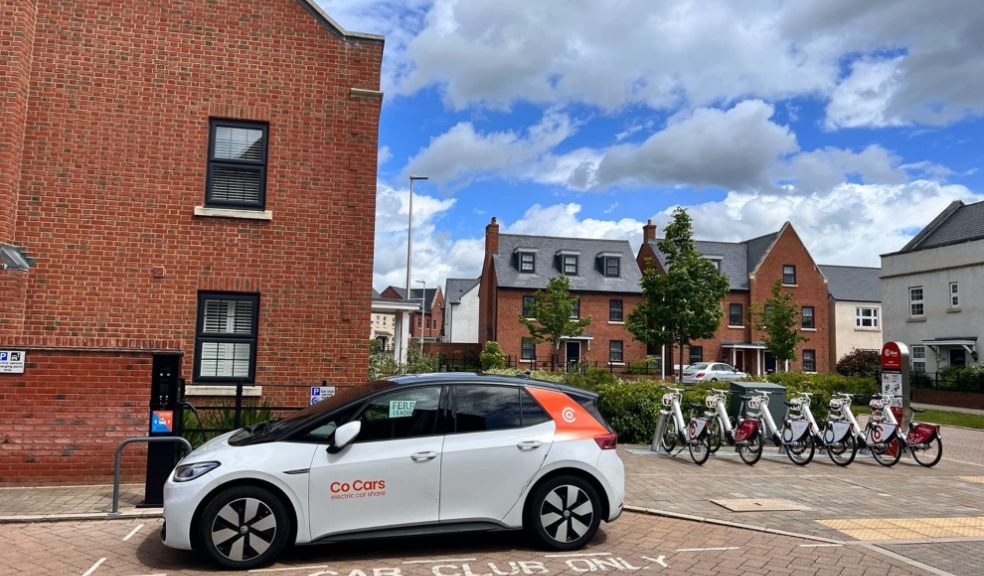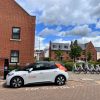
Devon ‘mobility hub’ receives gold award from national shared transport charity
A Devon ‘mobility hub’ delivered by social enterprise Co Cars has been recognised for promoting greener journeys with a gold award from the national shared transport charity, CoMoUK.
The site at Seabrook Orchards in Topsham, near Exeter, hasCoMoUK’s highest standard of accreditation for a new development and is only the second such facility to be officially recognised by the charity.
Mobility hubs bring together shared, public and active travel modes, along with community facilities, and redesign and reallocate space away from the private car.
They are used in many cities across Europe and North America and are increasingly spreading in the UK.
The hubs can take several different forms, ranging from larger interchanges in busy city centres to mini stations which are tailored to suburban or rural areas.
The Seabrook Orchards facility was launched by not-for-profit social enterprise Co Cars in May and is the first at a housing development in Exeter.
It has been made possible thanks to a partnership with Devon County Council, Bloor Homes and the landowners and management agents Darts Farm.
The hub is powered by 100 per cent renewable energy from Good Energy. It features a brand-new electric shared Co Car, Co Bikes e-bikes and a docking station.
There is a dedicated charger for the Co Car plus a public charger, both supplied by Econetiq. It is located just 100m from dedicated cycle routes and the nearest bus stop, with the 57 bus route providing frequent connections to both Exeter and Exmouth.
Seabrook Orchard residents were offered free first year membership of Co Cars and a driving credit to get them on the road. An on-site event gave them the opportunity to find out more about the services and to try the e-bikes for themselves.
Since the hub opened there have been almost 2,000 e-bike rentals and more than 20 per cent average car utilisation.
Trip analysis shows the majority of bike journeys from the housing development end in Exeter city centre, Digby and Sowton train station, and the Royal Devon and Exeter Hospital, demonstrating that the bikes provide important connections to retail, onward travel and employment.
It is estimated each shared Co Car removes 8.5 private cars from the road and around 50 per cent of Co Bikes trips replace journeys that would have been made by a car.
CoMoUK accreditation creates a set of standards for hubs to be measured against, relating to six key areas of design:
- Visibility and accessibility – hubs must be identifiable as part of the transport network, and accessible to all
- Choice of sustainable modes – including public and shared modes, with consideration of pedestrians
- Ease of switching between modes – this link should apply in both physical and digital terms
- Ensuring traveller safety is a key priority
- The design should include non-transport practical facilities
- Visual, social and community appeal to enhance the local area
Richard Dilks, chief executive of CoMoUK, said: “Mobility hubs are exciting ways to boost sustainable transport, improve public health and save people money.
“The combination of the cost-of-living and climate crises make it more important than ever to properly manage space for shared, active and public transport as an alternative to private car use.
“Mobility hubs are increasingly popular on the continent and it’s time for the UK to embrace this idea to improve air quality, decarbonise the transport sector, support more active travel, and revitalise town centres for local communities.
“We are encouraged that local authorities and housing developers are actively considering mobility hubs.
“We’re delighted to be in a position to formally accredit the hub at Seabrook Orchards with a gold award, and hope this sets a trend that will be adopted in Devon and right across the UK.”
Nic Eversett, managing director of Co Cars, added: “It’s an honour to receive this accreditation for Seabrook Orchards and I’d like to thank our project partners for their support in making it happen.
“Mobility hubs make it very easy for people to make more sustainable travel choices - it’s been fantastic to see residents embrace the services it offers. Moreover, the hub has also sparked the interest of our stakeholders, including on-site visits to find out more. We look forward to launching more in the years to come.”














